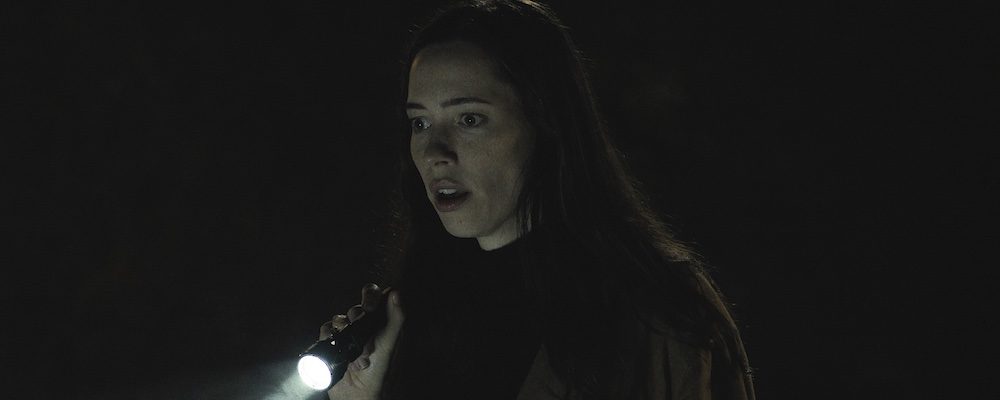Rebecca Hall Brings Real Dread and Loss to ‘The Night House’
Alci Rengifo
“The Night House” is a haunted film on two levels. There are definitely specters in its story meant to spread terror. More effectively, however, it’s about the haunting agony of loss. This is evoked so effectively, that for much of the first act, it’s easy to forget Rebecca Hall is supposed to be playing a character in a horror thriller. Hall anchors the narrative with a unique combination of dark humor and searing emotion. For the most part, director David Bruckner understands that the best horror is palpably connected to something real. The ghouls feel more unnerving when they embody something plausible.
Hall is Beth, a high school teacher living in those forest-strewn parts of America that always make the perfect setting for mystery. A few days ago her husband Owen (Evan Jonigkeit) committed suicide and the emotional shock is now present in Beth’s daily life. Her colleagues try to give company and support, even if they are taken aback at how Beth can crack a blunt joke or two to cope. Now inhabiting an empty home with a picturesque lake view, Beth struggles with processing why Owen made such a rash decision. Their marriage seemed so good. Besides, she was the one struggling with depression. Then, the stereo in their living room turns on by itself at night. There are strange knocks or the hint of footsteps. Beth’s iPhone rings. It is Owen’s number. A strange, garbled voice answers. Is she going insane? Or could it be him from the beyond? Beth begins searching through items Owen left behind, including his own phone, and finds photos of another woman. Now desperate to get answers, Beth will discover things about the past as frightening as the possibility of supernatural forces.
In addition to the memorable lead performance, “The Night House” signals that Bruckner continues to grow as a filmmaker. He first gained real attention directing the segments of two omnibus horror films, “Southbound” and “V/H/S.” In 2018 he made “The Ritual” for Netflix, an atmospheric thriller about a group of friends lost in the Swedish wilderness. It had a story that began well then descended into pure absurdity, involving cults and half-animal Nordic gods trotting the forest. Yet there was no denying the craft in the images and pacing. “The Night House” also begins with visceral force. The opening moments in the screenplay by Ben Collins and Luke Piotrowski seem influenced by Ingmar Bergman, in the dark serenity of Beth enduring loneliness and quiet anguish. She dreams of seeing Owen through her window, standing naked in the lake. At dinner with friends like fellow teacher Claire (Sarah Goldberg), she jokes about death and suicide, but we sense the pain beneath the half-smile. One of Hall’s great moments in the film takes place when a parent comes into her classroom, wanting to know why her kid got a C. Beth is sick of mundane worries and bluntly tells the mom about Owen shooting himself. It’s a rare, sober examination of pain in a genre film.
Because Beth as a character is established so well, and her predicament is terribly plausible, Bruckner is able to effectively recycle some recognizable scares. He avoids easy “boo moments” in the first act, preferring the chill of sensing there’s a presence in Beth’s house. When the stereo turns on and the iPhone rings, not too much is shown, and the fear is sensory. A distant, garbled voice, like a radio transmission, is eerier than some CGI terror. Later on there will be the kind of rattling, loud scares horror fans will walk in expecting. That’s also when the film is at its weakest. We’ve seen so many movies where people are dragged across the floor, levitated or thrown against a mirror by invisible forces. It is fine in a well-done, pure popcorn spectacle like last year’s “The Invisible Man,” and Bruckner skillfully pulls off the required shower scene (though why someone would shower in what is obviously a haunted house remains a real mystery). But the real tension builds when Beth visits a bookstore to seek out the woman in Owen’s photos, or when her dreams lead her to another house in the woods with a shocking revelation.
Once Beth finds out what was really going on, those of us accustomed to every horror device in the manual might be tempted to shrug. What still makes even the more predictable material work are Hall’s urgent, sharp acting and Bruckner’s atmospheric eye. Hall’s take is also unique in that Beth isn’t some innocent, doe-eyed victim. She bites back with her comments, trusts few people and has a strength that can only be bent by real, sheer horror. “The Night House” thus closes as a pretty strong movie within its genre. Creepy shadows stalk corners and the music by Ben Lovett evokes the texture of an enveloping nightmare. The best part is the way a good director comes together with a magnificent actor, making something that reaches a little deeper than mere spooks.
“The Night House” releases Aug. 20 in theaters nationwide.

